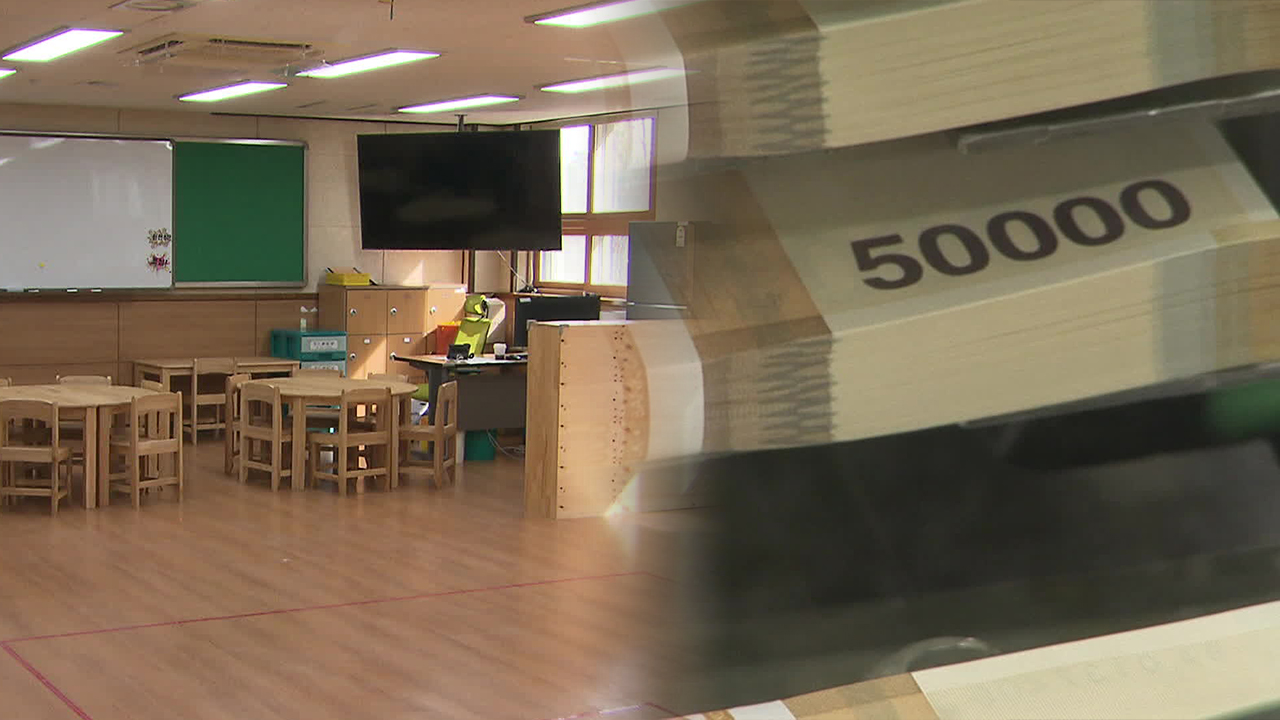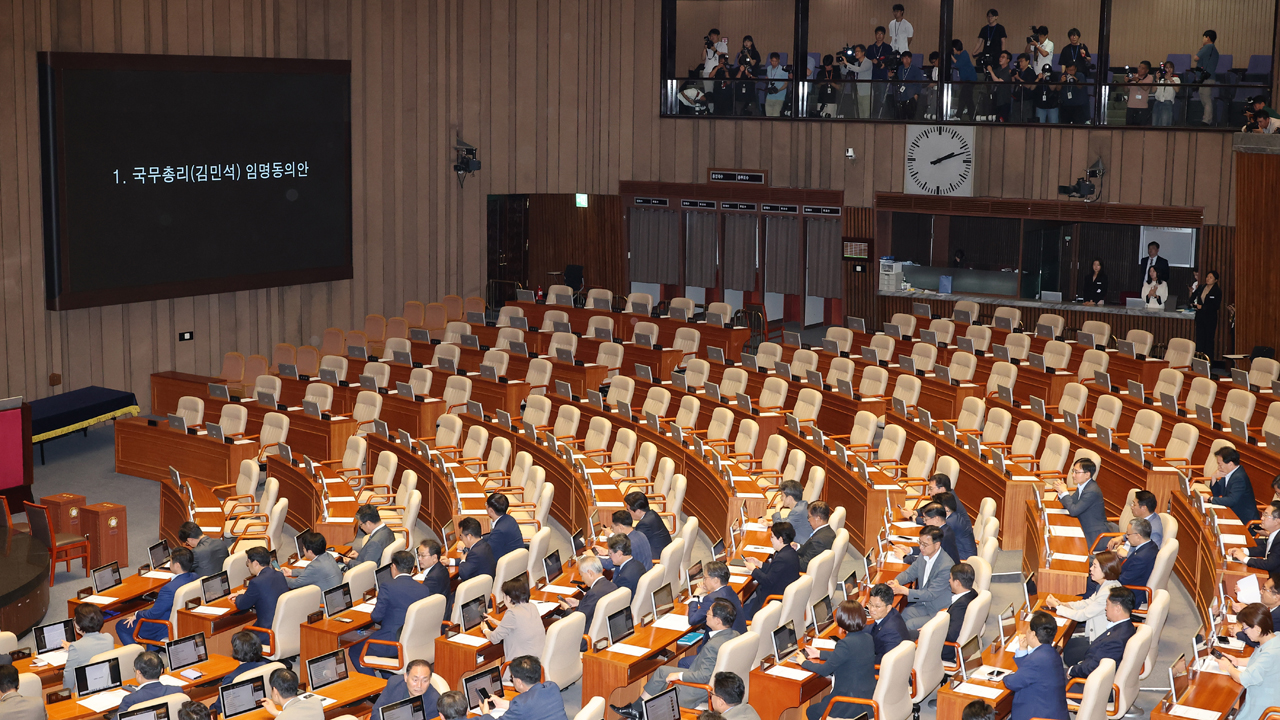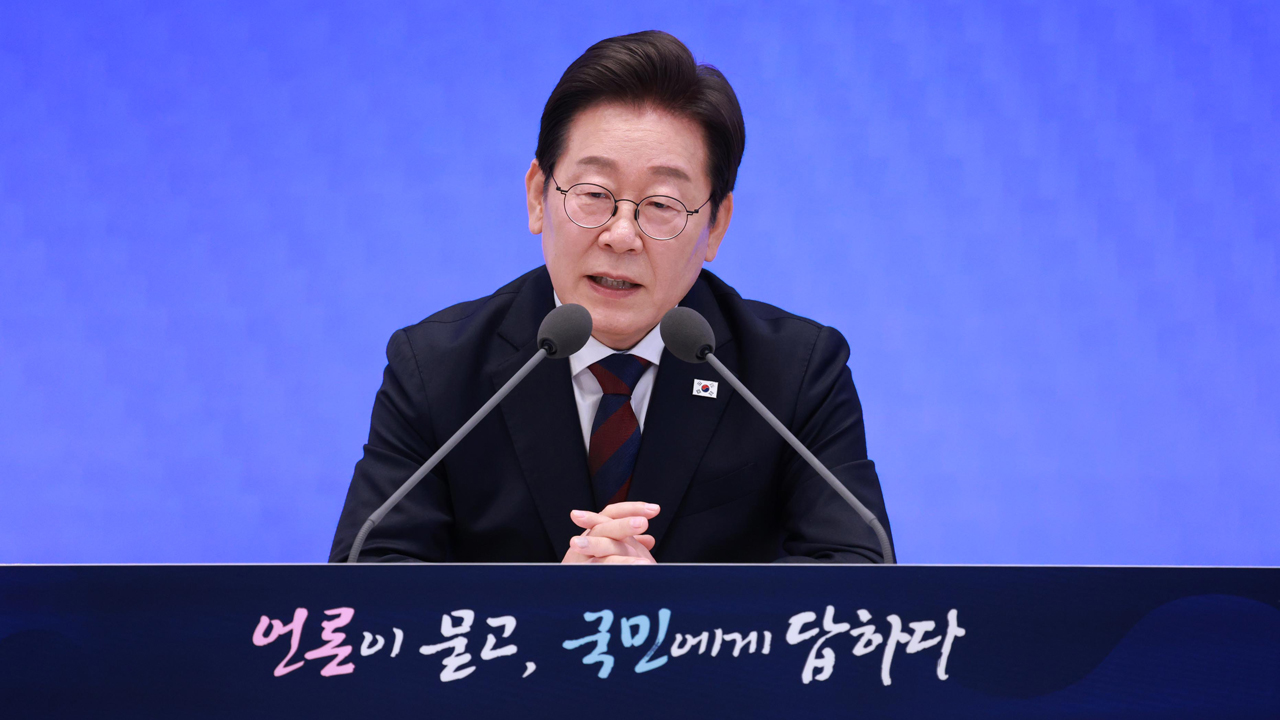Tax revenue shortfall hits 30 trillion won; gov't is to use other funds and cut local grants
입력 2024.10.28 (23:48)
읽어주기 기능은 크롬기반의
브라우저에서만 사용하실 수 있습니다.
[Anchor]
This year, the tax revenue shortfall is estimated to reach 30 trillion won.
The government's plan to address this shortfall was announced today (10.28).
The goal is to utilize various funds without incurring debt.
This can be seen as "robbing Peter to pay Paul."
Kim Jin-hwa reports.
[Report]
An old elementary school building in Chuncheon, Gangwon Province is set to become a special education facility for children with disabilities, but the expected amount of grants from the government has become uncertain, leading to difficulties in securing the budget.
According to the revised estimate, actual national tax revenue is 29.6 trillion won short of the budget, which means that grants and subsidy taxes linked to tax revenue will decrease by 9.7 trillion won.
The government has stated that it will initially send 3.2 trillion won, considering local finances, and will reduce payments by that amount in the next two years.
This is essentially applying the concept of 'advance payment'.
[Choi Sang-mok/Deputy Prime Minister for Economy/Today/National Assembly Audit: "There are various difficulties faced by local governments. As I mentioned earlier, in such cases, we are discussing ways to support them, including taking over local bonds."]
Including the money to be sent, about 16 trillion won, which is half of the shortfall in tax revenue, will be borrowed from funds that have been set aside for specific purposes.
These include the foreign exchange stabilization fund to respond to exchange rate fluctuations, the public capital management fund which serves as a kind of emergency fund, and the housing and urban fund, which includes savings for housing subscription.
This method was chosen to avoid issuing national bonds, but borrowing from surplus funds increases the proportion of 'deficit debt' that must be repaid with taxes among national debt.
[Woo Seok-jin/Professor of Economics at Myongji University: "Opportunity cost wise, the potential earnings that could come from those funds will be lost, resulting in an effect similar to issuing national bonds."]
Concerns are also being raised about using up to 6 trillion won from the foreign exchange stabilization fund amid increasing volatility in the foreign exchange market due to the U.S. presidential election and the Middle East conflict.
The government responded that it has been inevitably utilized within a range that does not hinder foreign exchange market responses.
KBS News, Kim Jin-hwa.
This year, the tax revenue shortfall is estimated to reach 30 trillion won.
The government's plan to address this shortfall was announced today (10.28).
The goal is to utilize various funds without incurring debt.
This can be seen as "robbing Peter to pay Paul."
Kim Jin-hwa reports.
[Report]
An old elementary school building in Chuncheon, Gangwon Province is set to become a special education facility for children with disabilities, but the expected amount of grants from the government has become uncertain, leading to difficulties in securing the budget.
According to the revised estimate, actual national tax revenue is 29.6 trillion won short of the budget, which means that grants and subsidy taxes linked to tax revenue will decrease by 9.7 trillion won.
The government has stated that it will initially send 3.2 trillion won, considering local finances, and will reduce payments by that amount in the next two years.
This is essentially applying the concept of 'advance payment'.
[Choi Sang-mok/Deputy Prime Minister for Economy/Today/National Assembly Audit: "There are various difficulties faced by local governments. As I mentioned earlier, in such cases, we are discussing ways to support them, including taking over local bonds."]
Including the money to be sent, about 16 trillion won, which is half of the shortfall in tax revenue, will be borrowed from funds that have been set aside for specific purposes.
These include the foreign exchange stabilization fund to respond to exchange rate fluctuations, the public capital management fund which serves as a kind of emergency fund, and the housing and urban fund, which includes savings for housing subscription.
This method was chosen to avoid issuing national bonds, but borrowing from surplus funds increases the proportion of 'deficit debt' that must be repaid with taxes among national debt.
[Woo Seok-jin/Professor of Economics at Myongji University: "Opportunity cost wise, the potential earnings that could come from those funds will be lost, resulting in an effect similar to issuing national bonds."]
Concerns are also being raised about using up to 6 trillion won from the foreign exchange stabilization fund amid increasing volatility in the foreign exchange market due to the U.S. presidential election and the Middle East conflict.
The government responded that it has been inevitably utilized within a range that does not hinder foreign exchange market responses.
KBS News, Kim Jin-hwa.
■ 제보하기
▷ 카카오톡 : 'KBS제보' 검색, 채널 추가
▷ 전화 : 02-781-1234, 4444
▷ 이메일 : kbs1234@kbs.co.kr
▷ 유튜브, 네이버, 카카오에서도 KBS뉴스를 구독해주세요!
- Tax revenue shortfall hits 30 trillion won; gov't is to use other funds and cut local grants
-
- 입력 2024-10-28 23:48:51

[Anchor]
This year, the tax revenue shortfall is estimated to reach 30 trillion won.
The government's plan to address this shortfall was announced today (10.28).
The goal is to utilize various funds without incurring debt.
This can be seen as "robbing Peter to pay Paul."
Kim Jin-hwa reports.
[Report]
An old elementary school building in Chuncheon, Gangwon Province is set to become a special education facility for children with disabilities, but the expected amount of grants from the government has become uncertain, leading to difficulties in securing the budget.
According to the revised estimate, actual national tax revenue is 29.6 trillion won short of the budget, which means that grants and subsidy taxes linked to tax revenue will decrease by 9.7 trillion won.
The government has stated that it will initially send 3.2 trillion won, considering local finances, and will reduce payments by that amount in the next two years.
This is essentially applying the concept of 'advance payment'.
[Choi Sang-mok/Deputy Prime Minister for Economy/Today/National Assembly Audit: "There are various difficulties faced by local governments. As I mentioned earlier, in such cases, we are discussing ways to support them, including taking over local bonds."]
Including the money to be sent, about 16 trillion won, which is half of the shortfall in tax revenue, will be borrowed from funds that have been set aside for specific purposes.
These include the foreign exchange stabilization fund to respond to exchange rate fluctuations, the public capital management fund which serves as a kind of emergency fund, and the housing and urban fund, which includes savings for housing subscription.
This method was chosen to avoid issuing national bonds, but borrowing from surplus funds increases the proportion of 'deficit debt' that must be repaid with taxes among national debt.
[Woo Seok-jin/Professor of Economics at Myongji University: "Opportunity cost wise, the potential earnings that could come from those funds will be lost, resulting in an effect similar to issuing national bonds."]
Concerns are also being raised about using up to 6 trillion won from the foreign exchange stabilization fund amid increasing volatility in the foreign exchange market due to the U.S. presidential election and the Middle East conflict.
The government responded that it has been inevitably utilized within a range that does not hinder foreign exchange market responses.
KBS News, Kim Jin-hwa.
This year, the tax revenue shortfall is estimated to reach 30 trillion won.
The government's plan to address this shortfall was announced today (10.28).
The goal is to utilize various funds without incurring debt.
This can be seen as "robbing Peter to pay Paul."
Kim Jin-hwa reports.
[Report]
An old elementary school building in Chuncheon, Gangwon Province is set to become a special education facility for children with disabilities, but the expected amount of grants from the government has become uncertain, leading to difficulties in securing the budget.
According to the revised estimate, actual national tax revenue is 29.6 trillion won short of the budget, which means that grants and subsidy taxes linked to tax revenue will decrease by 9.7 trillion won.
The government has stated that it will initially send 3.2 trillion won, considering local finances, and will reduce payments by that amount in the next two years.
This is essentially applying the concept of 'advance payment'.
[Choi Sang-mok/Deputy Prime Minister for Economy/Today/National Assembly Audit: "There are various difficulties faced by local governments. As I mentioned earlier, in such cases, we are discussing ways to support them, including taking over local bonds."]
Including the money to be sent, about 16 trillion won, which is half of the shortfall in tax revenue, will be borrowed from funds that have been set aside for specific purposes.
These include the foreign exchange stabilization fund to respond to exchange rate fluctuations, the public capital management fund which serves as a kind of emergency fund, and the housing and urban fund, which includes savings for housing subscription.
This method was chosen to avoid issuing national bonds, but borrowing from surplus funds increases the proportion of 'deficit debt' that must be repaid with taxes among national debt.
[Woo Seok-jin/Professor of Economics at Myongji University: "Opportunity cost wise, the potential earnings that could come from those funds will be lost, resulting in an effect similar to issuing national bonds."]
Concerns are also being raised about using up to 6 trillion won from the foreign exchange stabilization fund amid increasing volatility in the foreign exchange market due to the U.S. presidential election and the Middle East conflict.
The government responded that it has been inevitably utilized within a range that does not hinder foreign exchange market responses.
KBS News, Kim Jin-hwa.
-
-

김진화 기자 evolution@kbs.co.kr
김진화 기자의 기사 모음
-
이 기사가 좋으셨다면
-
좋아요
0
-
응원해요
0
-
후속 원해요
0












![[단독] 김민석 총리, 취임 첫 일정으로 ‘송미령 반대’ 농민단체 농성장 방문](/data/news/2025/07/03/20250703_YUTdgQ.png)


이 기사에 대한 의견을 남겨주세요.